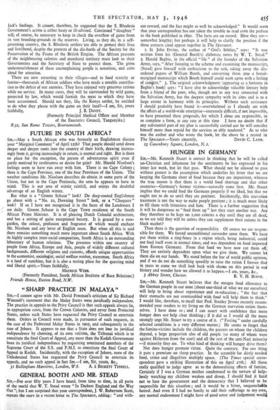FUTURE IN SOUTH AFRICA?
SIR,—May a South African who was formerly an Englishman discuss your " Marginal Comment " of April 12th? That people should send down deeper and deeper roots into the country of their birth, drawing increas- ingly from it, giving increasingly in return, is normal and right. But is there no place for the exception, the person of adventurous spirit even if partly motived by restlessness or desire for gain? Mr. Harold Nicolson's feelings seem to have run away with him. There is no Cape Colony ; there is the Cape Province, one of the four Provinces of the Union. The weather conditions Mr. Nicolson describes do obtain in some parts of the Union, but not in the Cape Peninsula, the area he appears to have in mind. This is our area of winter rainfall, and enjoys the doubtful advantage of an English winter. • But what is a " Groote Schuur " look? Do deep-rooted Englishmen go about with a " No. to, Downing Street " look, or a " Chequers " look? If so I have not recognised it in the faces of the Londoners I see daily. Groote Schuur is the Cape Town residence of the South African Prime Minister. It is of pleasing Dutch Colonial architecture, and has a setting of quite exceptional beauty. It is graced by a rose- garden, the colour, profusion and fragrance of which would enchant Mr. Nicolson and any lover of English roses. But when all this is said there remains something much more important about South Africa. With its highly complex inter-racial composition, South Africa is an outstanding laboratory of human relations. The presence within one country of people from Africa, Europe and Asia, people of widely different cultural backgrounds, different religions and customs, affords unique opportunities to the economist, sociologist, social welfare worker, statesman. South Africa is a land of sunshine, but it is also a testing place for the questing mind and liberal spirit.—Yours faithfully, MAURICE WEBB.
(Formerly President, South African Institute of Race Relations.) Friends House, Euston Road, N.W.






























 Previous page
Previous page